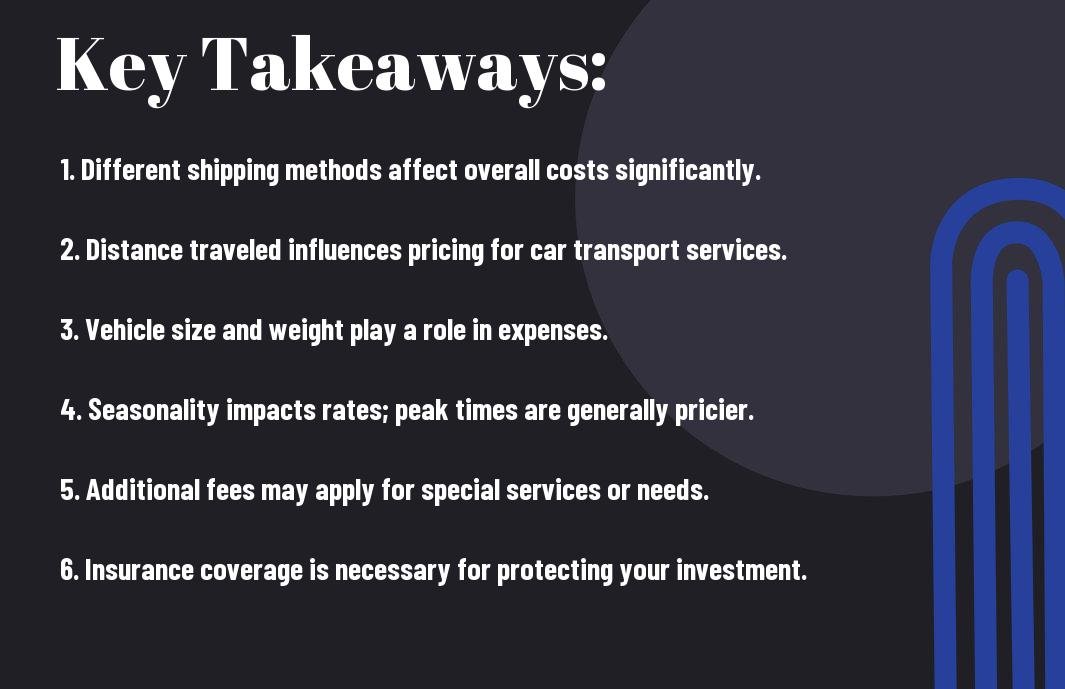Shipping your car across the country can seem overwhelming, but it doesn’t have to be! Understanding the cost breakdown will help you navigate this process with confidence. Factors like distance, vehicle type, and shipping method can significantly affect the price you pay. Additionally, be aware of potential hidden fees that may arise. To further assist you, check out our guide on Ship Your Car to Another State: Expert Tips and Cost for valuable insights and tips to ensure a smooth shipping experience!
Key Takeaways:
- Shipping Method: The cost of shipping your car can vary significantly based on the method you choose, whether it’s open transport or enclosed transport, impacting your overall budget.
- Distance and Destination: The distance traveled and specific destination play a major role in determining the shipping cost; longer distances typically lead to higher fees.
- Additional Fees: Be aware of potential additional fees, such as fuel surcharges or insurance, which can add to the total cost of transporting your vehicle.
Understanding Shipping Costs
For anyone considering shipping their car across the country, understanding the costs involved is vital. The total price can vary based on several factors, including the method of transport, distance, and the type of vehicle. It’s important to do your research and get quotes from multiple shipping companies to find the best deal that meets your needs.
Base Shipping Fees
Around the start of your car shipping journey, you’ll encounter base shipping fees. These fees typically cover the primary cost of transporting your vehicle from one location to another. They can vary significantly, so it’s wise to compare different carriers to ensure you’re getting a fair rate.
Additional Charges
For many vehicle owners, additional charges may come as a surprise when shipping a car. These can include costs for things like insurance, fuel surcharges, or specialty services like expedited shipping or enclosed transport.
Even small additional charges can add up quickly, so it’s wise to review the fine print. Keep an eye out for insurance fees to protect your investment during transit, as well as fuel surcharges that can fluctuate based on fuel prices. If your car has special requirements, such as non-operational vehicles or unique shipping needs, the costs could increase further. By being well-informed, you can plan your budget and avoid unexpected expenses on your shipping journey.
Factors That Impact Pricing
You should be aware of several factors that can influence the cost of shipping your car, including:
- Distance and route
- Vehicle type and size
- Season and demand
- Transport method
- Condition of your vehicle
Any of these aspects can lead to variations in pricing, so it’s important to evaluate them when budgeting for your car shipment.
Distance and Route
On average, the distance your vehicle needs to travel plays a significant role in determining shipping costs. Longer distances will generally result in higher fees. Additionally, the route taken can influence the price; for example, urban areas might incur extra charges due to heavier traffic or accessibility challenges.
Vehicle Type and Size
Factors like your vehicle’s type and size can greatly affect shipping costs. Smaller sedans usually have lower rates compared to larger SUVs or trucks. This is due to the space they occupy during transportation and the weight that impacts fuel costs.
For instance, shipping a classic car or a luxury vehicle may lead to additional charges because of their value and special handling requirements. In contrast, a standard sedan is often more economical to ship. Be sure to consider both the size and type of your vehicle, as they can make a noticeable difference in the overall cost of car shipping.
Choosing the Right Shipping Method
After deciding to ship your car, it’s important to assess the various shipping methods available. Your choice will depend on your budget, the level of protection you want for your vehicle, and your timeline. Different approaches may impact the cost and convenience, so understanding your options will ensure you make the best decision for your car shipping needs.
Open vs. Enclosed Transport
For those who prioritize cost-effectiveness, open transport is a popular choice, as it typically comes with lower rates. However, it exposes your car to the elements and potential road debris during transit. If you have a luxury or classic vehicle that deserves extra care, enclosed transport offers full protection from weather and damage, albeit at a higher price.
Door-to-Door vs. Terminal-to-Terminal
At the end of the day, choosing between door-to-door and terminal-to-terminal shipping really comes down to what suits your lifestyle best. Door-to-door service is extremely convenient, as it allows for seamless pickup from your location and delivery directly to your specified destination. Meanwhile, terminal-to-terminal can save costs but requires you to drop off and pick up your vehicle at designated locations.
Also, keep in mind that door-to-door shipping is generally more expensive but offers great convenience. A reputable carrier will coordinate the entire process, giving you a sense of security. In contrast, terminal-to-terminal shipping may be more budget-friendly but does require extra effort on your part. Think about your timeline and convenience, as well as the safety and condition of your vehicle when making your decision.
Preparing Your Car for Shipping
Many people underestimate the importance of properly preparing their car for shipping. Ensuring that your vehicle is in the best possible condition not only helps facilitate a smooth transport process but also protects it from potential damage while on the road.
Essential Steps to Take
Your first step should be to clean your car thoroughly, both inside and out. This allows you to inspect for any existing damage. Next, remove all personal belongings and detachable items, as they can get lost or damaged during transit. Finally, make sure your vehicle has less than a quarter tank of gas to minimize weight while ensuring it’s still operable.
Documentation and Insurance
On the day of shipment, you must have all the necessary documentation ready and ensure your car is properly insured. This includes the title, registration, and any other pertinent documents that demonstrate ownership or vehicle status.
In fact, having adequate insurance coverage is vital when shipping your car. You should consult with your insurance provider to confirm your policy protects you during transit. Additionally, you’ll want to keep copies of all relevant documents on hand, such as the bills of lading and inspection reports, to assist in any claims or issues that may arise. Proper documentation assures you that your vehicle is safe and supports you in resolving conflicts should damage occur during transport.
What to Expect During the Shipping Process
Unlike local car transport, shipping your vehicle across the country involves meticulous coordination and planning. You will encounter a few steps, from scheduling your pickup to the actual transportation, which might take several days. During this period, your selected auto transport company will keep you informed and should provide support should any questions arise. The key here is to stay in touch with your transporter for a smooth experience.
Timeline and Tracking
Process your shipment carefully as timelines can vary based on the distance and route. Typically, you can expect transportation to take anywhere from 1 to 2 weeks, depending on your starting point and destination. Many companies offer tracking services that enable you to monitor your vehicle’s journey in real-time, alleviating any worries about its whereabouts.
Receiving Your Vehicle
Timeline for receiving your vehicle will generally be provided ahead of time by the transport company. You will want to coordinate expectations with your driver regarding the delivery window to ensure you’re available to inspect your vehicle upon arrival.
But it is important to fully inspect your vehicle as soon as it arrives. Check for any visible damages or discrepancies from when it was initially loaded. While most transport companies handle your vehicle with care, unexpected issues can occur during transit. Completing a quick inspection and documenting your findings with photos ensures a smoother resolution process if any damage occurred. Once everything is satisfactory, you can feel reassured that your car has traveled safely across the country!
Tips for Budgeting Your Shipment
Once again, effective planning is key to successfully managing your car shipping costs. Here are some tips to help you budget effectively:
- Research and compare shipping quotes
- Factor in potential insurance costs
- Consider transport options (open vs. enclosed)
- Account for fuel surcharges and additional fees
- Plan for storage costs if necessary
After you consider these factors, you’ll be better prepared for your car shipment budget.
Finding Discounts
Around every corner, you may find opportunities to save on your car shipping costs. Look for any discounts through auto transport companies, membership programs, or seasonal promotions. You might also want to consider booking your shipment during off-peak times to take advantage of lower rates.
Planning for Unexpected Costs
Beside your initial quote, it’s wise to anticipate any unexpected costs that may arise during the car shipping process. This can include things like vehicle repairs, added insurance coverage, or even delays that incur additional fees.
Planning for these unexpected costs is important as they can significantly affect your overall budget. Make sure to set aside an emergency fund for potential repairs or unforeseen circumstances, such as transport delays. Additionally, be mindful of additional fees that may arise from changes in shipping dates, which could lead to higher costs. By preparing for these possibilities, you’ll safeguard your budget and enjoy a smoother car shipping experience.
Final Words
To wrap up, understanding the cost breakdown of shipping your car across the country can help you plan better and avoid unexpected expenses. From transport type to insurance fees, knowing what to expect allows you to make informed choices and ensures a smoother experience. Whether you’re moving for work or adventure, having a clear picture of your expenses will help you enjoy every mile of your journey without worry. Safe travels!
Q: What factors contribute to the cost of shipping my car across the country?
A: The cost of shipping your car can vary based on several factors. Key contributors include the distance of the shipment, the size and weight of your vehicle, the type of transport service chosen (open vs. enclosed), pickup and delivery locations (urban vs. rural), and the time of year. Additional fees may apply for expedited shipping, special handling for classic or luxury vehicles, and fuel surcharges that can fluctuate. Understanding these factors will help you better anticipate the overall cost.
Q: Are there any hidden fees associated with car shipping that I should be aware of?
A: While most reputable car shipping companies provide transparent quotes, there may still be additional fees you should consider. These might include charges for additional services such as door-to-door delivery, terminal handling, insurance coverage beyond the basic policy, or fees for vehicles that require special handling due to modifications. Always review the provided contract thoroughly and ask the shipping company for clarification on any charges that seem unclear to ensure there are no unpleasant surprises.
Q: How can I minimize the cost of shipping my car across the country?
A: To minimize the cost of car shipping, you should consider a few strategies. Firstly, be flexible with your shipping dates, as off-peak times may offer lower rates. Secondly, opt for open transport instead of enclosed, as it tends to be more economical. Shopping around and obtaining multiple quotes from different companies can also help you find a better deal. Additionally, decluttering your vehicle before shipping and ensuring it is in good condition can reduce weight and potentially eliminate additional fees.

